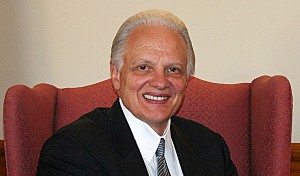Federal judge blasts John Doe prosecutors – again – as he denies records release

By M.D. Kittle | Wisconsin Reporter
MADISON, Wis. – In a scorching critique, U.S. District Court Judge Rudolph Randa verbally hammers the prosecutors in a politically charged John Doe investigation for seeking “refuge in the Court of Public Opinion, having lost in this Court of law.”
The federal judge’s stinging assessment of the prosecutors-turned defendants in a civil rights lawsuit came in a ruling Thursday that rejects in part unsealing a raft of records related to the investigation, a move that Randa believes is needed to protect two unnamed intervenors in the matter.
Randa’s multi-part order quickly followed the 7th Circuit U.S. Court of Appeals’ order unsealing numerous records in the lawsuit, filed by conservative activist Eric O’Keefe and his Wisconsin Club for growth, among a multitude of targets in the nearly two-year-old probe.
ORDER IN THE COURT: U.S. District Court Judge Rudolph Randa shut down the John Doe investigation, asserting the prosecutors’ application of the law was “simply wrong.” – AP Photo
The defendants – including Milwaukee County District Attorney John Chisholm, the Democrat who launched the investigation in late summer 2012; two of his assistant DAs; special prosecutor Francis Schmitz; and a shadowy contracted investigator – have reversed their entrenched position that all documents must remain sealed.
In agreeing with a media coalition that asked Randa to unseal reams of John Doe-related documents, the prosecutors insisted that the probe had become so widely publicized that secrecy is no longer justified. The prosecutors, in a filing last month, criticized O’Keefe and the club for asking the court to keep sealed some records while opening up the rest.
“(It is) beyond irony that the plaintiffs and their counsel now ask the Court to block media access to the documents that outline the investigation and detail the reasons why the plaintiffs’ conduct was subject to scrutiny,” the prosecutors claimed.
Saying the prosecutors’ claim “smacks of irony,” Randa in his ruling Thursday said their position is “at odds with their duty as prosecutors, which is to see that in any John Doe proceeding the rights of the innocent accused are protected in pursuit of a criminal investigation.”
“That duty would seem to dictate that the (prosecutors’) position on this issue should coincide with that of the Unnamed Intervenors even though the information gained through the John Doe investigation is being used in this civil action,” the judge wrote.
Indeed, that’s the law.
As Randa has noted, picking up on the verbiage of the unnamed intervenors, Wisconsin’s unique John Doe law is a “kissing cousin” of the grand jury procedure. But grand juries come with a jury of peers, while John Doe probes are in the hands of one judge, vested with significant powers.
Like grand juries, John Doe probes are conducted in secret to prevent “testimony which may be mistaken or untrue or irrelevant from becoming public,” Randa quotes in his order. “One of the principal reasons for preserving the secrecy of grand jury proceedings is to protect the reputations of both witnesses and those under investigation,” he further quotes.
The intervenors, also targets of the investigation, argued in their motion to keep the court documents sealed that Randa has ordered the John Doe shut down through a preliminary injunction. Further the federal judge has concluded that the prosecutors’ theory that conservative organizations illegally coordinated with Republican Gov. Scott Walkers’ campaign is “simply wrong,” a position shared by the investigation’s presiding Judge Gregory Peterson.
“A glaring injustice could be inflicted and irreparable injury caused to the reputation of a person if it were to become known that there is or ever was before the grand jury any proceeding concerning him if he were not subsequently indicted,” Randa quoted, in asserting that the “ongoing risk to the Unnamed Intervenors’ reputations is all too real.”
Ultimately, Randa concluded that he must not permit the original parties of the civil rights lawsuit to “safeguard their own interests to the detriment of non-parties who have not opened the door to exposure by filing suit … and will suffer greater personal harm than any organization can assert.”
The judge said he does appreciate the “intense public interest surrounding this case.” Still the “zealous pursuit of information threatens to envelop and irreparably harm the Unnamed Intervenors, alongside all the other targets of the John Doe investigation who have suffered in silence.”
“In this manner, wholesale unsealing would actually undermine the Court’s injunction by subjecting those who facilitated protected political speech to unwanted public scrutiny,” Randa said.
So Randa denied the media coalition’s motion to unseal the records in question and granted the unnamed intervenors’ motion to maintain sealing certain documents.
He then granted O’Keefe’s motions to file various materials under seal, but denied the Milwaukee County prosecutors’ “motion for leave to file materials under seal.”
And the judge ordered the plaintiffs and the defendants to work with the unnamed intervenors to file a “joint report regarding the extent to which the balance of the record in this case should be unsealed. That report is expected within 14 days.
“Obviously, this means that the plaintiffs and the defendants must allow the Unnamed Intervenors to access the sealed record in this case,” Randa wrote.
Finally, Randa notes the unsealing of certain documents by the 7th Circuit in its 268-page release, and that, basically, that genie is out of the bottle.
“Therefore, the Unnamed Intervenors’ motion to maintain sealing is now moot with respect to these docket entries,” the judge wrote.
Contact M.D. Kittle at mkittle@watchdog.org







